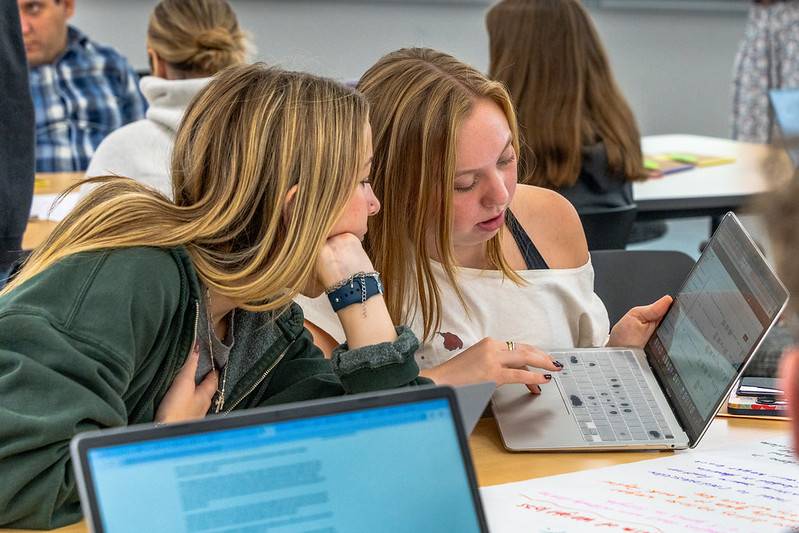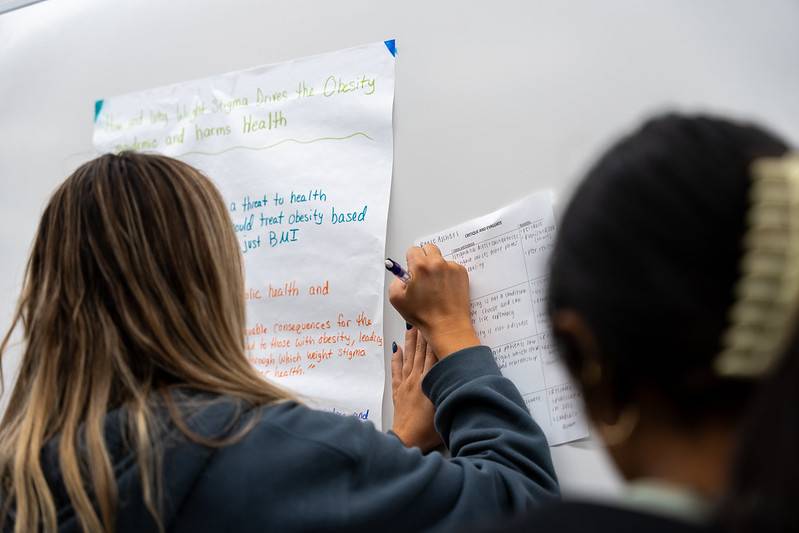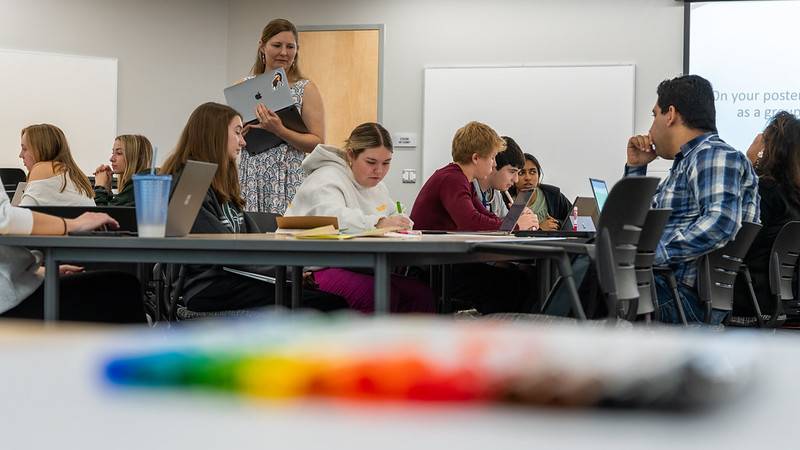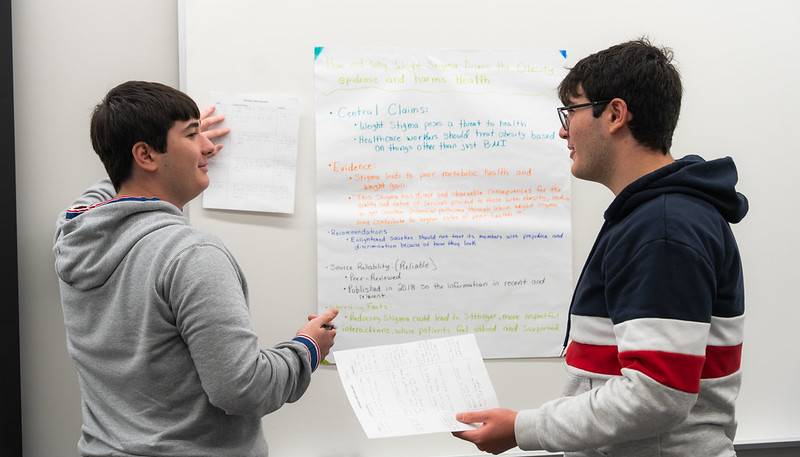Meet the new Human Biology course
Article Highlights
- The Human Biology Program, the largest and most diverse program in the College of Natural Science, has unveiled a new course in a curriculum focused on biology, health and community.
- HBIO295: Human Biology and Society is part of a growing curriculum that’s expected to be fully funded within the next three to five years and will more fully integrate the biological sciences with social determinants of health.
- “Some estimates are that at least 50% of health outcomes are determined by societal impacts — things like socioeconomic status, education, occupation, the neighborhood environment where you live,” said Cori Fata-Hartley, director of the Human Biology Program. “We want to bring this to students’ attention early in their undergraduate years so they can view the rest of their classes and their careers through this lens.”
The Human Biology Program, the largest and most diverse program in the College of Natural Science, has unveiled its first new course in more than 20 years.
The program introduced HBIO295 as the first course in a developing three-course core curriculum that integrates the biological sciences with social determinants of health.
“We have a lot of classes that human biology students take where they learn about the science of human biology, how the body works, what happens when it goes wrong,” said Cori Fata-Hartley, director of the Human Biology Program. “But the reality is that most health outcomes are dictated by much more than just basic biology.”

The curriculum is called “Biology, Health and Community,” and it’s being designed to teach undergraduate students with an interest in health professions how societal factors play essential roles in diseases, diagnoses, treatments and outcomes.
“Some estimates are that at least 50% of health outcomes are determined by societal impacts — things like socioeconomic status, education, occupation, the neighborhood environment where you live,” said Fata-Hartley, who earned her doctorate in medical sciences and is also the assistant dean for fixed-term faculty and academic specialist development.
“That includes things like access to green spaces, the food quality that is available to you, institutionalized racism and other forms of oppression,” she continued.
“All of these factors have significant impacts on health outcomes, and science has demonstrated they are more important than genetics or even access to healthcare. We want to bring this to students’ attention early in their undergraduate years so they can view the rest of their classes and their careers through this lens.”
Positive feedback
Survey results suggest that early versions of the new course are already having an impact. HBIO295: Human Biology and Society introduces students to the concept of structural competency, or how societal structures have a huge influence and impact on personal choices and health outcomes.
Ryan Chackunkal, a human biology major and aspiring medical doctor, took HBIO295 as a sophomore in the fall of 2023.
“I was very surprised,” said Chackunkal, who is from Livonia. “I thought if you have type 2 diabetes, you just go to the doctor and get medicine, but now I realize how societal forces can affect health outcomes.”
Different sections of the course focused on the biology and social determinants of different diseases, such as diabetes, but also conditions including dementia, lead poisoning and more.
“This class really changed my perspective on how you should wholistically approach a patient, and I’m really appreciative of that,” Chackunkal said.

“When somebody has type 2 diabetes, for example, it's often seen as a
moral failing somehow — that they just eat the wrong foods or don't exercise enough, or they're just lazy, so it's their fault,” Fata-Hartley said. “But this doesn't take into account all the factors that can contribute to diabetes, with lack of access to healthy food and being able to afford healthy food being two commonly cited examples.”
The HBIO curriculum includes courses in the social sciences and other disciplines that explore societal impact. However, in these settings, students don’t always connect the study of society to the study of human health and their future careers, Fata-Hartley said.
“We're preparing them for when they get to these professions so that they're more open to the ideas of structural competency, and they're more motivated to help serve patients in a more informed way,” Fata-Hartley said. “They may also become leaders who try to address these structural problems.”
This resonated with Lizzie Ochoa, a junior from Grand Rapids. She took the first pilot version of HBIO295 in the fall of 2022 and liked it so much that she served as an undergraduate learning assistant for the class in subsequent semesters.
“The class not only affected my thoughts on health care and how to become a better health care provider, it also encouraged me to think outside of the box in other classes when it comes to thinking of solutions,” Ochoa said. “I think about social factors and different kinds of interventions in various situations — who’s included, who’s not and how they might be helped.”
A growing program
The Human Biology Program is just that: a program. It is not a department.
Originally developed as an interdepartmental major for undergrads in 1999, the program is administered by the college’s dean's office.
That’s created both advantages and challenges.
When the program began 25 years ago, all but one course could be offered by other existing units or departments because all core courses are essentially the same for pre-health majors.
Whether students were interested in becoming a physician, a physician’s assistant, a dentist, an optometrist or another type of health or biomedical professional, they would take the same introductory courses and labs.
Over that time, the Human Biology Program grew into the largest major in the college. There are currently about 1,500 undergraduates in the program.
It’s also the most diverse major in the college in terms of race and ethnicity, first generation to college and Pell eligibility, which is a proxy for socioeconomic status.
“The number of majors has just kept going up, up and up,” Fata-Hartley said. “People flock to this major because of the name ‘human biology,’ and that's what they're interested in.”
Thanks to the steady and growing student interest, as well as recent investments from college leadership, the program has grown from having one faculty member to six over the last three years. The emerging core curriculum is also taking shape, but there’s still work to be done.
“Improving the student experience is a huge part of the strategic plan, and re-imagining the Human Biology Program certainly is an integral step toward achieving that,” College of Natural Science Dean Eric Hegg said.
“A huge part of the strategic plan is ensuring that students have a positive experience. Investing in the Human Biology Program certainly is an integral step toward achieving that. It’s really important for Human Biology students to feel a sense of community, and part of that community is to have more classes that are specifically developed for their students.”

Putting the ‘human’ in the Human Biology Program
The new curriculum is intended to better prepare pre-health students to deliver inclusive and equitable healthcare, as well as promote a sense of community and increase student success.
Two of the three courses of the soon-to-be mandatory curriculum are already in place: the new course, HBIO295, and HBIO495: Capstone in Human Biology, a writing course required for human biology majors to earn their degrees.
The remaining course in the curriculum, HBIO395: Human Biology and Community, is a proposed community-engaged learning class. That means students will work with community partners, particularly those focused on health issues or on factors related to the social determinants of health. Hegg is optimistic that the new core curriculum can be fully funded within the next three to five years.
Elizabeth Tinsley Johnson, assistant professor of human biology, is the curriculum coordinator for HBIO495 who identified challenges in the course and collaborated to develop the initial versions of HBIO295.
After being hired in 2018, she discovered that HBIO495 was not a true capstone experience because students were being introduced to essential ideas and skills for the very first time.
“Most students said the capstone class was the first time they understood the human experience to be equally important as, for example, the cellular mechanisms that underpin disease,” she said.“The perspective that medicine is ‘just biology’ has changed drastically over recent years, and now post-graduate programs expect applicants to understand concepts that broadly fall under the structural determinants of health.”
Faculty also found that students were not adequately prepared for the capstone class in other ways. For instance, instructors noticed that students were struggling to engage in the scientific literature and to evaluate claims based on evidence.
The core curriculum focuses on foundational skills like identifying and finding sources, evaluating the quality of sources and initiating the critical reading process earlier. The goal is for students to build these writing and critical thinking skills in HBIO295 and develop them in HBIO495 so they can demonstrate competency in the capstone course.
“I read the course description but didn’t expect to enjoy the class so much,” said Jourdyn Starr, a junior in the Human Biology program who took HBIO295 in the spring of 2023. “I realize the importance of the class, and we read a lot of empirical papers and scientific research. We learned how to annotate and read them critically. That was my first time having to dig deep like that and it was definitely helpful because it’s hard.”

Fostering community and success for all students
Capped at 25 students, HBIO295 is also helping foster a sense of community. Because students in the Human Biology Program take a majority of their classes through different departments, it could be challenging to meet peers in their major.
“Some students said the senior-level course was the first time they had an opportunity to get to know and to learn from other students in their major,” Tinsley Johnson said. “I really wanted to offer this community-building experience earlier, for freshmen and sophomores.”
This not only makes the experience more enjoyable for students, deepening their sense of belonging, but it also has a profound effect on student success.
While many human biology majors achieve their career goals, that’s not true for all students and it’s disproportionately true for certain groups.
First generation college students, students from a lower socioeconomic background and students of color historically have been under-represented in biomedical and health careers.
Another goal of the proposed curriculum is to minimize that opportunity gap.
“Human Biology is so big that if we reduce the opportunity gap in our program, it is going to have an impact on the broader numbers at MSU,” Fata-Hartley said. “This curriculum is designed not only for the specific content and skills we want students to learn, but also to create a sense of community and belonging, which research demonstrates improves student learning and success.
“I've been at MSU for 20 years,” she added, “and this is the most rewarding thing I've done here because it's so important.”